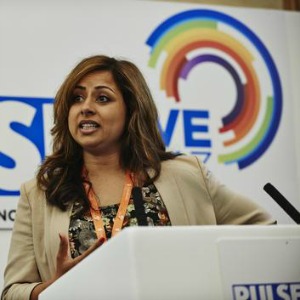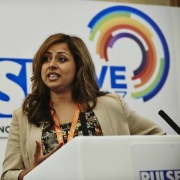What I’ve learned from… Being a CCG vice chair


Name:
Dr Nikita Kanani
Age: 33
Title: GP, NHS Bexley CCG vice chair, and quality lead of the Faculty of Medical Leadership and Management
Location: Bexley, south-east London
Always wanting to know the reason ‘why’ has given me the desire to take on varied roles that help me give my patients the very best care possible.
I am a south-east London GP and heavily engaged with NHS Bexley Clinical Commissioning Group as the integrated care lead. I am also the CCG’s clinical vice-chair and locality representative.
By working with my CCG, I am able to directly influence service redesign, address quality of care issues, implement systems that improve performance and understand how finance, commissioning and contracting operate.
I am also the quality lead for the Faculty of Medical Leadership and Management, an executive board member for the non-politically affiliated membership organisation, the National Association of Primary Care, co-chair of an online community, The Network, which has more 3,000 than healthcare professional members, and co-founder of a social enterprise called STEMMsisters, which gives young people from disadvantaged communities opportunities and support to develop their future.
Undertaking these varied roles enables me to answer some of the whys and translate them into improved services and relationships through my GP and commissioning work, which in turn, results in my patients receiving the sort of care I really think they will benefit from and deserve.
Here are five lessons that I think clinicians, commissioners and anyone else working in healthcare could learn from and adopt.
Research local third sector services that take referrals
The first lesson I’ve learned is to really know your local population as well as the services accessible to them. There is a wealth of health, social and voluntary services in Bexley and there are many tools to help GPs locate them, however, it’s difficult to remember them all when you have limited time with the patient.
Recently an elderly widowed patient started to book more frequent appointments with me. It was difficult to know how to help him – he didn’t quite fit the criteria for therapy and so I needed to find a more appropriate service. Through my CCG I met more of my voluntary sector colleagues and found out about the Age UK ‘Men in Sheds’ project. Not only was I able to help my patient, who has benefited greatly from it, I’ve also shared this information with my colleagues at the surgery who can also refer patients on.
Find out what support your colleagues need
Another important lesson I’ve learned is to remain an advocate for your peers. It’s imperative to have strong relationships with GP colleagues as well as other stakeholders. Clinical commissioning just doesn’t work without good relationships. For example, at NHS Bexley CCG, more than 30 GPs are involved or leading on areas of the commissioning process, from redesigning services to leading on safeguarding.
However, we know that many GPs, including myself, need developmental support to undertake their new roles and also to help encourage more clinicians to join the process.
In response, I have been able to work with managers at the CCG to create a development programme for clinical leads. Be sure to really listen to your colleagues’ concerns and try to find ways to improve working lives – this ultimately improves patient care.
I’ve also learned that it’s important to recognise that different people in an organisation have different learning needs and starting points. A Twitter chat may be sufficient for some but others prefer more in-depth workshops.
Understand your organisation
Organisations are about people, not structures. I’ve learned it’s important to recognise that different people in an organisation have different developmental needs and starting points. It’s also important to have organisational context, understand local pressures, and learn to find allies in your organisation so that you are not championing alone. When I was redesigning a hospital department I spent time understanding my colleagues perspectives and concerns, and discussed them over a series of meals.
Don´t be afraid to ask for support
I have also learned that you can undertake more than one role – but don’t be afraid to ask for support and try to look for the connections between the different opportunities when they arise.
For example, our new development programme for our CCG clinical leads pulls together support from trainers provided by the Faculty of Medical Leadership and Management and the National Association of Primary Care.
Above all though, make sure you understand what is important to you – personally and professionally and don’t compromise your values.
Build a team you can trust
The final lesson I’ve learned is about collaboration. It’s important to surround yourself with people that can support you and who you can rely on. Personally, that may be family, and professionally may mean having a team you can trust. My mentors have been crucial to me through my career but my husband, parents and brilliant nanny allow me to merge my work and life happily.









